Awesome Domain Adaptation Python Toolbox for Tensorflow and Scikit-learn
Project description
ADAPT
Awesome Domain Adaptation Python Toolbox
ADAPT is a python library which provides several domain adaptation methods implemented with Tensorflow and Scikit-learn.
Documentation Website
Find the details of all implemented methods as well as illustrative examples here: ADAPT Documentation Website
Installation
This package is available on Pypi and can be installed with the following command line:
pip install adapt
The following dependencies are required and will be installed with the library:
numpyscipytensorflow(>= 2.0)scikit-learncvxopt
If for some reason, these packages failed to install, you can do it manually with:
pip install numpy scipy tensorflow scikit-learn cvxopt
Finally import the module in your python scripts with:
import adapt
Reference
If you use this library in your research, please cite ADAPT using the following reference: https://arxiv.org/pdf/2107.03049.pdf
@article{de2021adapt,
title={ADAPT: Awesome Domain Adaptation Python Toolbox},
author={de Mathelin, Antoine and Deheeger, Fran{\c{c}}ois and Richard, Guillaume and Mougeot, Mathilde and Vayatis, Nicolas},
journal={arXiv preprint arXiv:2107.03049},
year={2021}
}
Quick Start
import numpy as np
from adapt.feature_based import DANN
np.random.seed(0)
# Xs and Xt are shifted along the second feature.
Xs = np.concatenate((np.random.random((100, 1)),
np.zeros((100, 1))), 1)
Xt = np.concatenate((np.random.random((100, 1)),
np.ones((100, 1))), 1)
ys = 0.2 * Xs[:, 0]
yt = 0.2 * Xt[:, 0]
# With lambda set to zero, no adaptation is performed.
model = DANN(lambda_=0., random_state=0)
model.fit(Xs, ys, Xt, yt, epochs=100, verbose=0)
print(model.history_["task_t"][-1]) # This gives the target score at the last training epoch.
>>> 0.0240
# With lambda set to 0.1, the shift is corrected, the target score is then improved.
model = DANN(lambda_=0.1, random_state=0)
model.fit(Xs, ys, Xt, yt, epochs=100, verbose=0)
print(model.history_["task_t"][-1])
>>> 0.0022
Examples
| Two Moons | Classification | Regression |
|---|---|---|
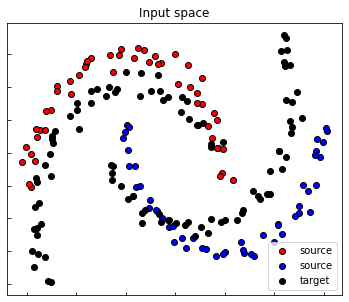  |
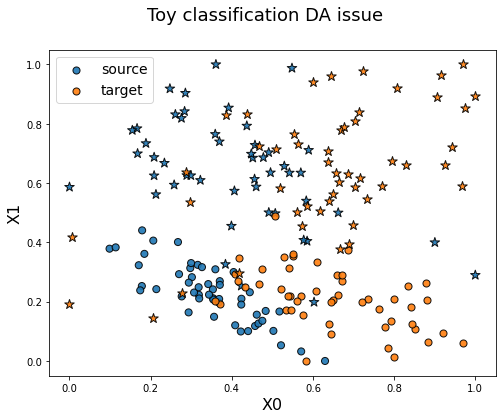  |
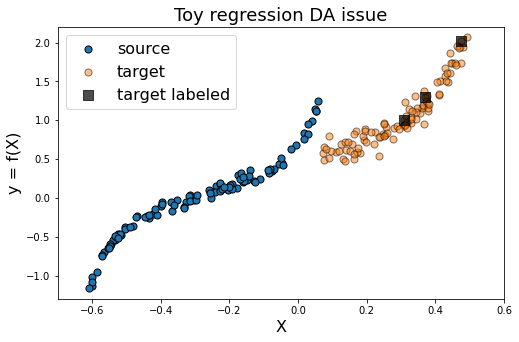  |
| Sample Bias | Multi-Fidelity | Rotation |
|---|---|---|
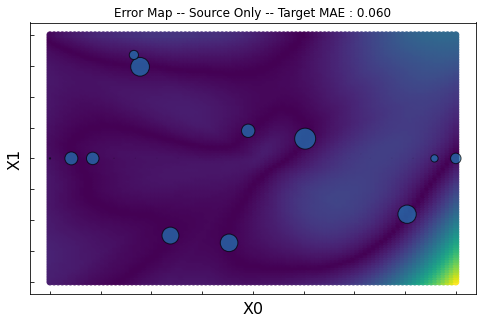  |
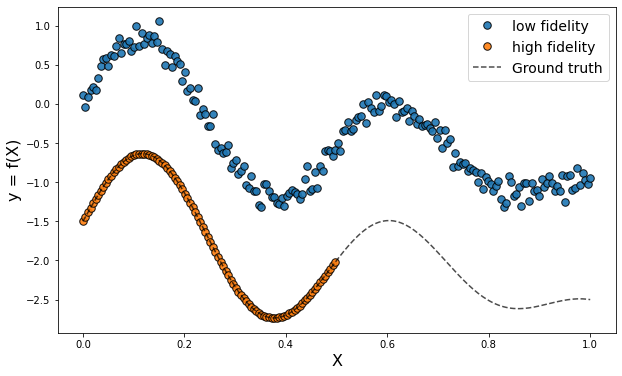  |
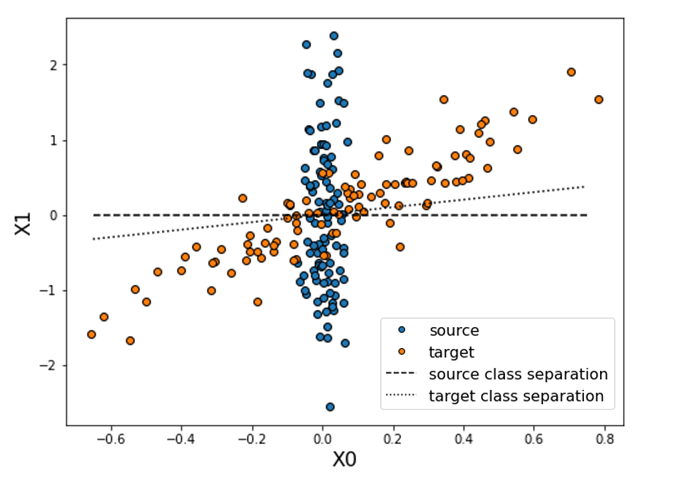  |
Content
ADAPT package is divided in three sub-modules containing the following domain adaptation methods:
Feature-based methods

- FE (Frustratingly Easy Domain Adaptation) [paper]
- mSDA (marginalized Stacked Denoising Autoencoder) [paper]
- DANN (Discriminative Adversarial Neural Network) [paper]
- ADDA (Adversarial Discriminative Domain Adaptation) [paper]
- CORAL (CORrelation ALignment) [paper]
- DeepCORAL (Deep CORrelation ALignment) [paper]
- MCD (Maximum Classifier Discrepancy) [paper]
- MDD (Margin Disparity Discrepancy) [paper]
- WDGRL (Wasserstein Distance Guided Representation Learning) [paper]
Instance-based methods

- KMM (Kernel Mean Matching) [paper]
- KLIEP (Kullback–Leibler Importance Estimation Procedure) [paper]
- TrAdaBoost (Transfer AdaBoost) [paper]
- TrAdaBoostR2 (Transfer AdaBoost for Regression) [paper]
- TwoStageTrAdaBoostR2 (Two Stage Transfer AdaBoost for Regression) [paper]
Parameter-based methods

- RegularTransferLR (Regular Transfer with Linear Regression) [paper]
- RegularTransferLC (Regular Transfer with Linear Classification) [paper]
- RegularTransferNN (Regular Transfer with Neural Network) [paper]
Acknowledgement
This work has been funded by Michelin and the Industrial Data Analytics and Machine Learning chair from ENS Paris-Saclay, Borelli center.
Project details
Release history Release notifications | RSS feed
Download files
Download the file for your platform. If you're not sure which to choose, learn more about installing packages.


















